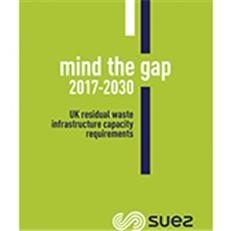SUEZ welcomes publication of ESA report on UK waste infrastructure capacity
The report compiles and compares the findings of a wealth of research into current and future residual waste treatment capacity in the UK, which has been produced over the past year by a range of the waste sector’s leading companies, including SUEZ.
At a national level, the Tolvik report demonstrates that there is uniformity between the individual capacity forecasts made by each of the major industrial players in the sector (those responsible for investing in the sector) – with only one divergent view. It clearly shows that the UK has, and will continue to have a capacity gap for the treatment of residual waste by means other than landfill.
Although the ESA goes as far as to call for more energy-from-waste capacity in its commentary on the report, SUEZ continues to take a “portfolio” approach to its mix of waste treatment infrastructure investment. However, SUEZ reiterates the ESA’s plea for clear ambition and long-term policy direction from Government to determine where future investment should occur in terms of both technology and geography.
All models in the research recognise the current importance of exports of residual, recycling and hazardous wastes to Europe and the need for time to transition to domestic treatment solutions. Refuse derived fuel exports are expected to continue in all the models, with variance only occurring in the scale of export. SUEZ considers that gradual on-shoring of materials should, and will, occur with the right policy and market conditions.
Stuart Hayward-Higham, author of Mind the Gap 2017-2013 and Technical Development Director at SUEZ recycling and recovery UK said:
“It is important that this is not viewed as the waste industry attempting to secure more energy-from-waste capacity than the nation needs. To the contrary, overstating the case for investment would only damage companies, like SUEZ, which continue to invest billions of private capital to provide this vital infrastructure.
“Our industry is not calling for subsidies, or to be propped up by the public purse. Our only requirement is political leadership to guide and safeguard future investment by our sector in the UK through towards 2050. This leadership is just as vital for local authorities who are setting their long term strategies and procuring major infrastructure or services.
“If, as a nation, we are to set out an ambition to reach a high level of recycling (beyond 60%) – investing in the recycling value stream rather than energy-from-waste – this will require much wider-reaching policy which seeks to facilitate new domestic markets for recycled products and influence the whole product and packaging lifecycle –from design through consumption, collection, reprocessing and manufacturing. The capacity gap will become a capacity crisis if we eschew energy-from-waste in favour of high-reaching recycling targets without robust policy action (and associated investment) to back it up.
“However, it is firmly our belief that this value stream approach needs to be considered at a regional level, which may result in different outputs for different regions dependent on the region’s role within the circular economy. For example, the Northern Powerhouse and Midlands Engine already have very different treatment capacity outlooks compared with the South East and will likely have very different future resource needs.
“Our own analysis has been more granular than most, looking at the regional dimension to infrastructure need and delivery. We need to ensure we have the right technology in the right place at the right time.”
This week, in its industrial strategy white paper, the Government announced its desire to move towards a more resource-efficient economy and recognises that a strong secondary materials market is key to the resource-productivity of British business. The white paper specifically mentions recycling and pledges to strengthen markets for secondary raw materials – but does not suggest how it will do this.
SUEZ believes that adopting policies which support the principle of Extended Producer Responsibility is one of the answers to this challenge. SUEZ calls on DEFRA, in its forthcoming Waste & Resources Strategy, to tackle this issue head on and provide the policy clarity we all need and to redefine, to an extent, how waste services and infrastructure are delivered in the longer term to maximise materials values.
